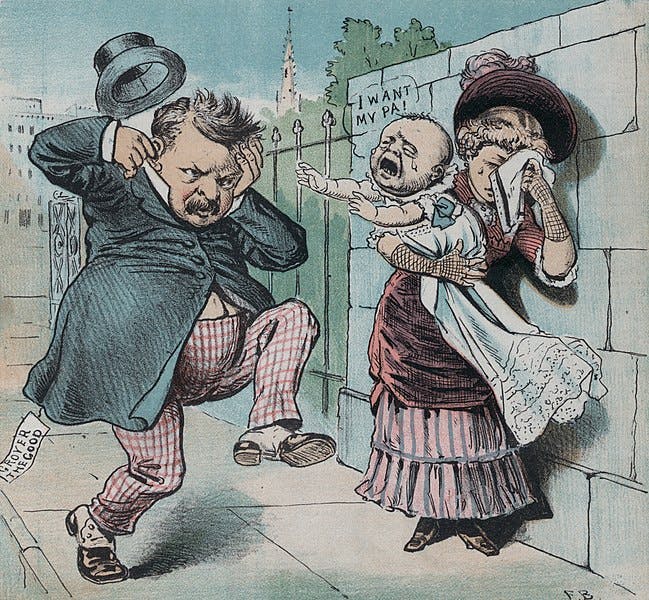This Presidents Day, Grover Cleveland and Benjamin Harrison Loom Large
Both Cleveland and Harrison put service to America first, and the nation was better for it.

The 1892 White House contestants, Presidents Cleveland and Benjamin Harrison, are having their moment. Since theirs was the only rematch like the looming one between Presidents Trump and Biden, Americans can hope they follow the same high road as their Gilded Age predecessors.
Cleveland first won the White House in 1884, beating the Republican candidate, Senator James Blaine. It was a battle of nasty allegations, including that Cleveland, a bachelor, had fathered a child out of wedlock.
Harrison — the great-grandson of a signatory to the Declaration of Independence, grandson of President William Henry Harrison, and a general for the Union in the Civil War — was no Blaine, honorable and boring in a way Americans in 2024 might find refreshing.
Harrison was nicknamed “the Human Iceberg” and President Theodore Roosevelt said he had “a handshake like a wilted petunia.” When invited to “board the Harrison bandwagon,” the GOP House speaker, Thomas Reed, remarked, “You should say ‘ice wagon.’”’
These are the trivial quips you’ll read about Harrison, ignoring accomplishments such as legislation to bust corporate trusts and of the first law to protect consumers, the Meat Inspection Act. However, in the first recording of a president, we can hear his impish energy. Even the iceberg had some fire.
Harrison lost the popular vote in 1888 but won in the Electoral College, as Mr. Trump did in 2016. “Cleveland,” the presidential historian, Louis Picone, tells the Sun, “accepted his defeat” without the now-familiar objections. Asked why he had lost, he “matter-of-factly replied, ‘It was mainly because the other party had the most votes.’”
First Lady Frances Cleveland, who had an 1886 wedding in the Blue Room, hungered for a rematch. Upon leaving the White House she told a servant, “We are coming back just four years from today,” but her husband took some convincing to fulfill the prophecy.
“I am in a miserable condition,” Cleveland wrote a friend of Democratic demands that he run again. He was, he said, “a private citizen without political ambition … pulled and hauled and importuned daily and hourly.”
Mr. Picone called Cleveland “a man of strong personal integrity.” His campaign slogan “and political North Star” was “‘A Public Office is a Public Trust.’ He was also a firm believer that democracy is about policy and party, not personality and power.”
Cleveland, Mr. Picone wrote, was “happy in retirement,” hunting with his rifle, which he named “Death and Destruction,” and fishing. Harrison, also fond of the rod and reel, might have joined him, but he ran rather than see Blaine again capture the Republican nomination.
“Tragically,” Mr. Picone said, “Benjamin Harrison largely lost interest in the campaign when his beloved wife died two weeks before the election.” All these factors combined to produce a fight over visions for the future rather than a mudslinging competition.
In “Grover Cleveland: A Study in Character,” Alyn Brodsky wrote that if 1888 had been “the dirtiest campaign on record,” 1892 “was the cleanest, and the quietest, and most mannerly. There was no personal abuse of the candidates.”
One issue that loomed over 1892 is in play this year: spending. After Harrison signed a $1 billion federal budget, Democrats seized on the “Billion-Dollar Congress” and campaigned on sound money, fiscal restraint, and limited government.
Age was a topic in 1892 as it is in 2024, where either Mr. Biden, 81, or Mr. Trump, 77, will be the oldest man ever elected. Harrison, the Sun wrote in July 1892, “will be in the 60th year of his age next month” and “Cleveland in his 56th.” Both candidates, the Sun noted, were “gray haired.”
Cleveland went on to become the only president to serve non-consecutive terms. A Republican, Senator William Allison of Idaho, told the New York Evening Post in 1908 that it was “God’s mercy to this country” that he, not Harrison, won — a testament to how well Cleveland kept the public trust.
Both Cleveland and Harrison put service to America first, and the nation was better for it. Should Messrs Trump and Biden, against all indications, follow the 1892 roadmap, whichever man ends up being elected, America will win.

